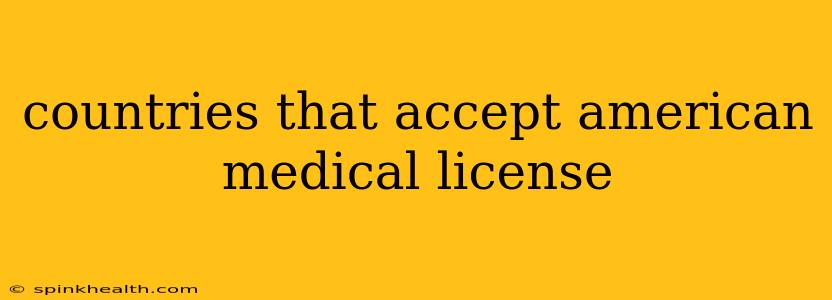Unlocking Global Opportunities: Where Your American Medical License Can Take You
The allure of practicing medicine abroad is strong for many American physicians. Perhaps you dream of experiencing different cultures, tackling unique medical challenges, or simply seeking a change of pace. But the question remains: which countries readily accept American medical licenses? The answer, unfortunately, isn't a simple list. It's a journey filled with nuances, varying requirements, and a healthy dose of perseverance. Let's embark on this journey together.
My name is Dr. Emily Carter, and I've spent years advising physicians on international medical licensing. I've witnessed firsthand the challenges and triumphs of those pursuing careers beyond American borders. This guide is based on my experience and extensive research, but it's crucial to remember that licensing regulations change. Always verify the most up-to-date information with the relevant authorities in the country you're targeting.
What Makes the Process So Complex?
Before we delve into specific countries, let's address the elephant in the room: the complexity. Each country has its unique regulations, often requiring extensive examinations, certifications, and potentially even further medical training. The level of acceptance isn't a simple "yes" or "no"—it's a spectrum.
Some countries might readily accept US medical licenses with additional qualifications, while others may require almost a complete restart of the licensing process. Language barriers, cultural differences in medical practices, and even visa requirements add layers of complexity.
Which Countries Are Relatively More Open?
While a definitive "easy" list is elusive, several countries have pathways that are comparatively less arduous for US-licensed physicians. These often involve reciprocal agreements, streamlined processes, or a high demand for medical professionals:
- Canada: While not a simple transfer, Canada has pathways for US-trained physicians. Expect rigorous examinations and credential assessments. The process varies depending on the province.
- Australia: Similar to Canada, Australia has established pathways, but expect thorough evaluations and potentially further training to align with their standards.
- United Kingdom: The UK welcomes international physicians, but the process is stringent, involving detailed assessments and often requiring additional exams or training.
- New Zealand: Similar to Australia and Canada, New Zealand requires comprehensive assessments and may necessitate further qualifications.
- Certain Caribbean Islands: Some Caribbean nations have programs aimed at attracting international physicians, though it's vital to research the legitimacy and standards of these programs thoroughly.
H2: What specific exams might I need to take?
The specific exams required vary drastically from country to country. For example, Canada might require the Medical Council of Canada Qualifying Examination (MCCQE), while Australia may mandate the Australian Medical Council (AMC) exams. The UK might involve the PLAB (Professional and Linguistic Assessments Board) exams. It is imperative to research the exact requirements for your target country well in advance.
H2: How long does the process typically take?
The licensing process can take anywhere from several months to several years, depending on the country, the individual's qualifications, and the complexity of the application process. Be prepared for a prolonged timeline and potential delays. Prompt and thorough application is key.
H2: What about language requirements?
Many countries require proficiency in their official language. This often involves language tests like IELTS or TOEFL. Failing to meet language requirements will immediately halt the licensing process.
H2: Are there any reciprocity agreements?
Reciprocity agreements exist between some countries, simplifying the licensing process for physicians already licensed in a partner country. However, these are not universal, and their existence doesn't guarantee an easy path.
H2: What are the job prospects like for international physicians?
Job prospects depend heavily on the country’s specific needs and the physician's specialty. Some specialties are in higher demand than others. Researching the current medical job market in your country of interest is crucial.
Embarking on Your International Journey
The pursuit of practicing medicine abroad is challenging but incredibly rewarding. Thorough research, patience, and persistence are key. Remember, this guide serves as an introduction; individual country-specific research is paramount to your success. Consult with organizations specializing in international medical licensing and immigration for personalized guidance. The world awaits—but proper planning is your passport to success.

